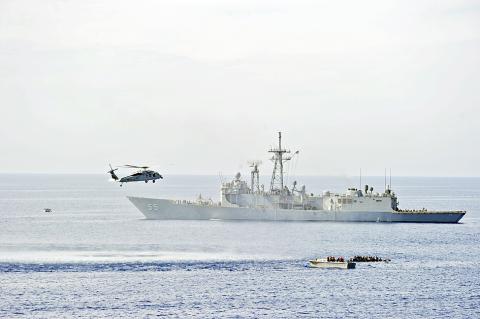Taiwan is grateful to the US for agreeing to sell four Perry-class guided missile frigates, the Ministry of National Defense (MND) said yesterday, adding that they would enhance the nation’s defense capabilities and contribute to peace and stability in the region.
China reacted by lodging a formal complaint with the US and calling for an end to arms sales to Taiwan.
US President Barack Obama on Thursday signed into law a bill that authorizes the sale of up to four Perry-class frigates to Taiwan. The US Senate and House of Representatives had both passed the bill earlier this month.

Photo: EPA
The sale of the frigates demonstrates the Obama administration and US Congress’ commitment to the Taiwan Relations Act and support for Taiwan’s security, while also attesting to the mutual friendship and strengthening of bilateral ties between Taipei and Washington, ministry spokesperson Major General David Lo (羅紹和) said.
The government has budgeted about NT$5.5 billion (US$174.8 million) to purchase two Perry-class frigates, Lo said, adding: “The navy will review its needs and decide whether to buy more frigates in the future.”
“The purchase program will follow the military’s arms procurement regulations. We shall be in close contact with our US counterparts to obtain the frigates’ shipboard architecture and weapons systems that are suited to our combat needs,” Lo said.
He added that the sale “will boost our military’s confidence and capability to defend the nation, and help maintain peace and stability in the region.”
The navy will send a team to the US next year in preparation for taking delivery of the frigates, which are expected to arrive in 2016 at the earliest.
The measure approved by the US government will allow the sale of four Perry-class frigates — the USS Gary, USS Carr, USS Taylor and USS Elrod — to Taiwan.
Ministry officials said they would replace the nation’s aging fleet of Knox-class vessels, which have been in service for about 50 years.
The 4,165-tonne Perry-class frigates are designed for marine-patrol warfare, with secondary anti-
aircraft and anti-ship capability.
US Representative Ed Royce, chairman of the US House of Representatives Committee on Foreign Affairs, said the arms sales would bolster Taiwan’s maritime security and its critical relationship with the US, as provided for in the Taiwan Relations Act of 1979.
“Few other pieces of foreign policy legislation have been as consequential as this act. With steadfast support from the United States Congress, Taiwan has become a thriving modern society that strongly respects human rights, the rule of law and free markets,” Royce said.
The US measure drew an angry reaction from Beijing, with Chinese Ministry of Foreign Affairs spokesman Qing Gang (秦剛) saying: “China is strongly dissatisfied” with the bill.
“We are firmly opposed to arms sales to Taiwan by the US,” he added, reiterating Beijing’s longstanding position.
“We have launched solemn representations with the US side,” he said, using formal language for a diplomatic protest, adding that Taiwan “remains the most sensitive issue in China-US relations.”
He also called on the US to cut official and military exchanges with Taiwan.
Additional reporting by AFP

CARROT AND STICK: While unrelenting in its military threats, China attracted nearly 40,000 Taiwanese to over 400 business events last year Nearly 40,000 Taiwanese last year joined industry events in China, such as conferences and trade fairs, supported by the Chinese government, a study showed yesterday, as Beijing ramps up a charm offensive toward Taipei alongside military pressure. China has long taken a carrot-and-stick approach to Taiwan, threatening it with the prospect of military action while reaching out to those it believes are amenable to Beijing’s point of view. Taiwanese security officials are wary of what they see as Beijing’s influence campaigns to sway public opinion after Taipei and Beijing gradually resumed travel links halted by the COVID-19 pandemic, but the scale of

TRADE: A mandatory declaration of origin for manufactured goods bound for the US is to take effect on May 7 to block China from exploiting Taiwan’s trade channels All products manufactured in Taiwan and exported to the US must include a signed declaration of origin starting on May 7, the Bureau of Foreign Trade announced yesterday. US President Donald Trump on April 2 imposed a 32 percent tariff on imports from Taiwan, but one week later announced a 90-day pause on its implementation. However, a universal 10 percent tariff was immediately applied to most imports from around the world. On April 12, the Trump administration further exempted computers, smartphones and semiconductors from the new tariffs. In response, President William Lai’s (賴清德) administration has introduced a series of countermeasures to support affected

Pope Francis is be laid to rest on Saturday after lying in state for three days in St Peter’s Basilica, where the faithful are expected to flock to pay their respects to history’s first Latin American pontiff. The cardinals met yesterday in the Vatican’s synod hall to chart the next steps before a conclave begins to choose Francis’ successor, as condolences poured in from around the world. According to current norms, the conclave must begin between May 5 and 10. The cardinals set the funeral for Saturday at 10am in St Peter’s Square, to be celebrated by the dean of the College

CROSS-STRAIT: The vast majority of Taiwanese support maintaining the ‘status quo,’ while concern is rising about Beijing’s influence operations More than eight out of 10 Taiwanese reject Beijing’s “one country, two systems” framework for cross-strait relations, according to a survey released by the Mainland Affairs Council (MAC) on Thursday. The MAC’s latest quarterly survey found that 84.4 percent of respondents opposed Beijing’s “one country, two systems” formula for handling cross-strait relations — a figure consistent with past polling. Over the past three years, opposition to the framework has remained high, ranging from a low of 83.6 percent in April 2023 to a peak of 89.6 percent in April last year. In the most recent poll, 82.5 percent also rejected China’s